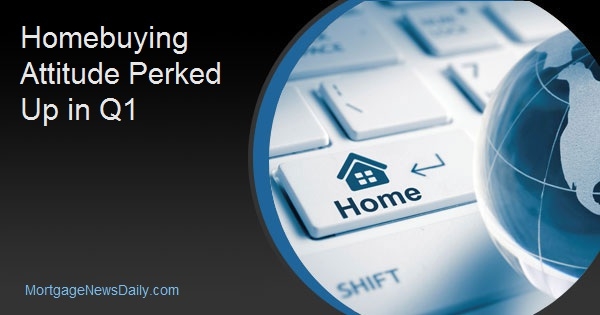Consumer attitudes about buying a home seem to be slowly swinging back to positive. The National Association of Realtors®, in its Housing Opportunities and Market Experience (HOME) survey for the first quarter, found 37 percent of respondents strongly believe now is a good time to buy. Only 34 percent expressed that sentiment in the fourth quarter 2018 survey although recent responses are still down from 38 percent one year ago. Only 35 percent of respondents said that this is not a good time to buy a home, compared to 37 percent in 2018's fourth quarter.
The survey also found that a majority of those polled, 53 percent, felt the economy is improving, down from 59 percent at the end of last year. The opinion was strongest among those earning $100,000 or more and those who live in rural areas. Fifty percent of Generation X and 42 percent of urban area residents also thought this was true.
NAR's chief economist Lawrence Yun says several factors are helping to improve the attitudes of potential homebuyers. "First, inventory has been rising, so those buyers interested in making a purchase will not be limited in choices. Additionally, more stable home price trends are leading to more foot traffic at various open house gatherings."
Sixty-one percent of respondents thought that their local home prices increased over the last year, down from 63 percent in the previous survey, and 31 percent said they had remained the same. Forty-seven percent expect prices in their local area will rise over the upcoming six months, 10 percent believe they will decline, and 43 percent anticipate no change.
Yun says the West is experiencing the most variation in expectations surrounding home prices. "A high percentage of the Western population believes that prices increased in the past year, while - possibly for the same reason - a higher segment from the West compared to other regions say prices could fall in the next 12 months. As to the broader economy, the perception is weaker and showing cracks in the Midwest." Overall, those living in the Northeast and South, those with incomes between $50,000 and $100,000, and renters are most likely to believe prices will rise in their communities
Amid respondents who do not presently own a home, 27 percent believe they would have a very difficult time qualifying for a mortgage given their current financial situation; 28 percent said it would be somewhat difficult, and 24 percent said they expect no difficulty at all. That last group has grown significantly from 21 percent last quarter and 19 percent this time last year.
Yun notes that mortgage affordability in 2019's first quarter has been more favorable for would-be homebuyers than it has been in recent quarters. "The Federal Reserve's decision to refrain from any foreseeable rate hikes was beneficial to potential buyers," Yun said. "That move directly contributed to mortgage rates declining in quarter one, which provided a second-chance opportunity to those looking to buy who were priced out last quarter."
NAR's survey was conducted via random-digit dial with 900 households each month from January through March. The data was compiled for this report representing a total of 2,710 household responses.







